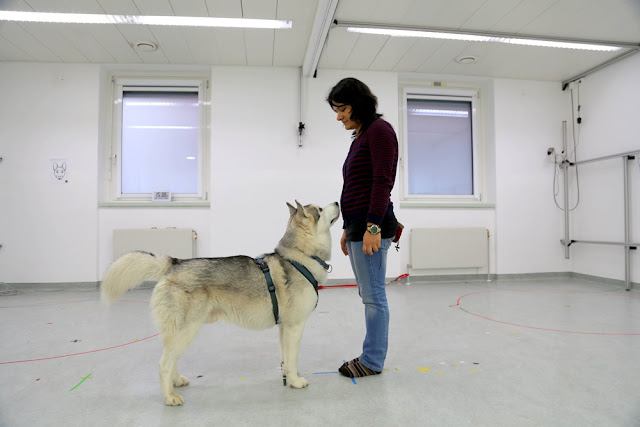 |
| Photo: Mary Lynn Strand / Shutterstock |
We know that as people get older, they may experience cognitive decline including in attention. We are used to hearing that doing lots of different activities that engage the brain may help to ward off some of these changes. It turns out that may also be the case for dogs.
As dogs get older, they experience a decline in attention just as older people do. But lifelong training can help to prevent this decline, according to research published last year by scientists at the Messerli Research Institute at the Vetmeduni Vienna. This is good news, because attention is important for human-canine communication and for other processes.
The study took pet dogs aged between 6 and just over 14 years. They were divided into 3 age groups: late adulthood (between 6 and 8 years), seniors (8 up until 10 years), and geriatric (10 years or over). There were 75 Border collies (59 of which were tested in an earlier study) and 110 dogs of other breeds and mixed-breeds.
They all took part in two experiments that were designed to be naturalistic such that the dogs did not need any prior training. The owners completed a questionnaire that included the dog’s participation in 13 different types of training, including puppy class, obedience, agility, service dog training, hunting/nose work, trick training/dog dancing, and sheep dog training.
The first experiment tested the extent to which a social or non-social stimulus could get and keep the dog’s attention. The non-social stimulus was a toy attached to some wire so that it could be moved up and down in front of the dog for 1 minute. The social stimulus was a person who came in, kept her back to the dog, and painted an imaginary wall for 1 minute.
 |
| A dog taking part in the first experiment. Photo: The Clever Dog Lab, Messerli Institute |
The results showed that senior and geriatric dogs took longer to look at both stimuli than those in late adulthood, and there was no effect of lifelong training on this. All of the dogs looked for longer at the person than at the toy.
Sustained attention declined with age and was worst in the geriatric dogs. But dogs with a high level of lifelong training kept their attention on the stimulus for longer than those with a low level of training.
Durga Chapagain, first author of the paper, said,
“The decrement of sustained attention in the older dogs is due to the repetitive, monotonous and non-arousing nature of the task, leading to a decrease in endogenous attentional control as the task advances.”The second experiment looked at selective attention. Each dog took part in a 5-minute clicker training session. At the very beginning, the experimenter called the dog to her and threw a piece of sausage on the floor. Then, every time the dog made eye contact with her, she clicked and then threw a piece of sausage on the floor. If the dog lost interest, she crinkled the plastic bag. We all know that's a good way to get a dog's attention!
This task requires the dog to switch attention from making eye contact with the person to finding the food on the floor.
 |
| A dog learning to make eye contact during the clicker training session. Photo: The Clever Dog Lab, Messerli Institute |
Unlike in humans, age did not affect selective attention in this task.
Dogs with higher scores for lifelong training and also dogs with prior experience of clicker training made eye contact faster than those with low levels of lifelong training and those with no specific experience of clicker training.
Older dogs took longer to find the food on the floor, with geriatric dogs taking the longest, and this ties in with previous work on aging in dogs. There were no differences due to lifelong training in the time to find food, but dogs with prior clicker training experience were quicker to find the food than those without. The clicker-trained dogs had more experience at looking for food after the click, by definition, and the researchers say they may also have increased anticipation of food.
They point out that all kinds of training involve the dog looking at the human. From these results, it’s not possible to separate the effects of clicker training specifically from other kinds of training, as clicker training contributed to the lifelong training scores.
It is probably no surprise that dogs with prior experience at clicker training did better at the clicker training, but it is worth noting that all of the dogs improved at the task of making eye contact during the 5 minute session. So it shows that you can train an old dog new tricks.
And of course the fact that dogs with more lifelong training did better on this selective attention task is very promising.
Friederike Range, senior author of the paper, said,
“Dogs with a high lifelong training score reacted faster in both measures of attention. This result is indeed a convincing proof for dog-owners to engage their dogs in different forms of physical and mental training, if they want their furry friends to retain their attentional abilities during aging.”For the Border collie owners out there who want to know how this breed compared to the other dogs, there were actually few differences, but the Border collies were faster at finding the food dropped on the floor. Because there was a wide variety of breeds and mixed-breeds in the other group, it’s possible that a larger sample size might have found other differences.
This is a fascinating study that suggests reward-based training has cognitive benefits that persist into the dog’s later life.
The paper is open access and you can read it via the link below, and you can follow the Clever Dog Lab on Facebook.
Love dogs, cats and science? Subscribe to Companion Animal Psychology
Reference
Chapagain, D., Virányi, Z., Wallis, L. J., Huber, L., Serra, J., & Range, F. (2017). Aging of attentiveness in border collies and other pet dog breeds: the protective benefits of lifelong training. Frontiers in aging neuroscience, 9, 100.
Companion Animal Psychology is a participant in the Amazon Services LLC Associates Program, an affiliate advertising program designed to provide a means for sites to earn advertising fees by advertising and linking to Amazon.com and affiliated sites. Companion Animal Psychology is also a participant in the Etsy Affiliate Program, an affiliate advertising program designed to provide a means for sites to earn advertising fees by advertising and linking to Etsy.com.









